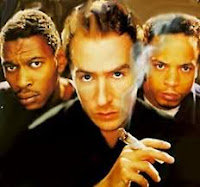Massive attack research
Massive attack-Unfinished sympathy research
Massive attack~the band
The musical group, Massive Attack were formed in 1988 in Bristol and are an English trip hip hop band. the group consisted of 3 members: Robert "3D" Del Naja, Grant "Daddy G" Marshall and formerly Andy "Mushroom" Vowles. Massive attack were one of the most influential group of their generation as they inspired diversity portrayed in the music video of their hit at number 13, unfinished sympathy. They had record labels with Virgin Records and EMI.
Blue lines~the album
Blue Lines is the debut studio album by English trip hop group Massive Attack, released on their Wild Bunch label through Virgin Records on 8 April 1991. A remastered version of the album was released on 19 November 2012. Blue Lines is generally considered the first trip hop album, although the term was not widely used before 1994.The album reached No. 13 on the UK Albums Chart; sales were limited elsewhere. A fusion of electronic music, hip hop, dub, '70s soul and reggae, it established Massive Attack as one of the most innovative British bands of the 1990s and the founder of trip hop's Bristol Sound.
Unfinished sympathy~the song and video
Baillie Walsh~the video director
Baillie Walsh is a director and actor, known for Flashbacks of a Fool (2008), Springsteen & I (2013) and Massive Attack: Eleven Promos (2001). A member commented,“It was quite a frightening experience,” recalls Shara. “But, like I said, Baillie’s got the ability to help you forget what’s going on and to just concentrate on what you’re doing. And, of course, I had these bodyguards behind me. I wasn’t on my own.”
Street Culture~what is is?
Street culture includes elements such as gangs, fashion, music and dance. Street Culture is a Cultural aspect of the streets in cities and towns where you find the youth expressing the creativity they have instilled within them. Popular styles of urban centres. Street culture may refer to: Urban Culture, the culture of towns and cities.
Post-punk~what is it?
Post-punk is a broad type of rock music that emerged from the punk movement of the 1970s, in which artists departed from the simplicity and traditionalism of punk rock to adopt a variety of avant-garde sensibilities. Inspired by punk's energy and DIY ethic but determined to break from rock cliches, artists experimented diversely with sources including electronic music, free jazz and black dance styles like funk, disco and dub; novel recording and production techniques; and ideas from art and politics, including critical theory, modernist art and literature. Communities that produced independent record labels, visual art, multimedia performances and fanzines developed around these pioneering musical scenes, which coalesced in cities such as London, New York, Manchester and San Francisco.



Comments
Post a Comment